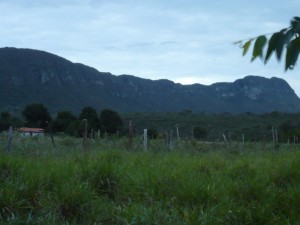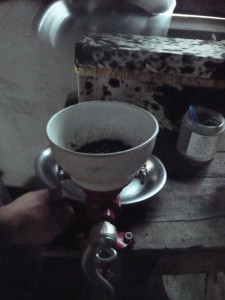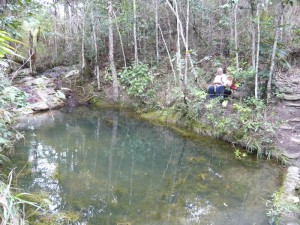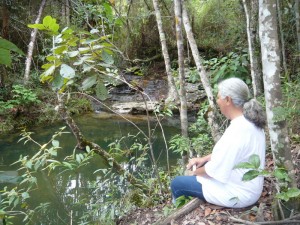It doesn’t seem real that we left the bus station at Belo Horizonte – MG only on February 1st. We’ve already met so many people along our path and seen so many special places that it seems impossible that everything happened in just 5 days.
I’m writing from Piatã, Bahia. We made a few changes to our plans in order to adjust our schedule to the availability of our guide, João, highly recommended by some of our friends to help us in the hikes in the national park of the Chapada Diamantina. One of our friends from Belo Horizonte has an aunt that owns an organic coffee farm in the Chapada. We were curious and luckily she agreed to have us over. That’ s how we met Brígida, who’s from Minas Gerais, mother of a very well raised son, about to be a grandmother and an organic coffee farmer.
Talking with Brígida and observing the scenery, we found out that Piatã is part of the “Rio das Contas” region. This region’s development was propelled by the discovery of gold in the 17th century. Gold exploitation went on for about 100 years and was abandoned when the gold reserves came to an end and diamonds were discovered in other areas of the chapada.
Piatã is currently a small town that thrives from agriculture, in particular from growing coffee. This land was responsible for the best coffee in Brazil in 2009. Its mountains, however, are enriched with iron ore and exploitation of this mineral has increased, which may compromise the scenery that left us in awe these days. Several mountains reign over the coffee farms, among them “Serra da Tromba” and “Serra do Santana”. Fortunately, Serra da Tromba has recently been declared an area of relevant ecologic interest.
But in addition to the beauty of this place, we discovered in Brígida the best reason for our trip to Piatã. She has enormous human appeal and our conversations filled our hearts with joy. At first, we thought that the examples we would describe in this website would come mainly from NGOs, companies, projects, etc. During these first five days, however, it has become clear to us that behind great projects and ideas are people, actual human beings with strong motivations to take decisions that are often non traditional.
Brígida is, without a doubt, one of these people. Before coming to Piatã, she worked for 12 years at a major Brazilian extraction company in Salvador, Bahia. She told us that her salary was good enough to allow her to buy a new car every year, pay the tuition of one of Salvador’s best schools for her son, among other comforts.
Many personal reasons and ideals, the search for a better quality of life and environmental awareness made her change her life. She accepted to take part in a voluntary dismissal plan from the company and decided to set up a bed and breakfast (“pousada”) in Piatã.
When we asked her why Piatã, Brígida told us that once, while she still lived in Salvador, she came to the town to celebrate the São João party (traditional Brazilian celebration that happens in June) and fell in love with the town. It’s the highest city in Bahia (around 1,260m of altitude), with a very nice temperature – believe it or not, you can even sleep with a blanket over you!
Brígida’s initial idea was to set up a “pousada”, a sort of small farm, close to the center of Piatã. But there were two great obstacles to this idea. The first was the lack of properties with the features that she wanted. The second was a local resistance to tourist activities. The local residents were afraid that what happened with the native residents of Lençois could happen to them. The tourism boom there was not accompanied by similar qualification of the region’s workers. So qualified labor came from outside the region and the previous residents were left to do manual, less qualified labor.
That’s how, one day, while she was looking for a place for her pousada, a local farmer and coffee grower told her that his farm was on sale and invited her for a visit, no strings attached, to see if she liked it. She reluctantly told him that she was looking for a small plot of land, next to town since she was hoping to open a pousada and needed a place with easy access. Even so, she decided to visit this farm. After all, people in town had spoken of waterfalls inside the property.
Brígida was charmed by the place at first sight, but is was the waterfall, which made her stay. When the owner took her there, she felt that she had to swim there. As she had not brought along her bathing suit, she asked the owner to keep away. Alone in that waterfall, she felt nature around her and the waters whispering in her ear: “Your role is to care for the waters of these rivers.”
She had never been much of a mystic, believed in God at best, so she quickly got dressed and left as soon as she could.
When she got back to town, the farmer asked:
– Did you like the property?
– Everything is gorgeous, wonderful, but I’m afraid that I don’t have enough money to pay you. How much are you asking for it?
The price was, in fact, more than she could afford, so she told him:
– Like I said before, I’m looking for a small plot of land close to town, I don’t have all that money.
The farmer asked Brígida:
– And how much do you have?
To which she answered:
– A third of what you’re asking for.
He returned the question:
– In cash?
Brígida:
– Yes, the money’s in the bank.
Farmer:
– Perfect, we’ll go to the notary early tomorrow morning, you pay me and I’ll sign the property over to you.
And that’s how Brígida tripled her equity, like magic. The farmer was also a merchant and needed liquidity at that moment.
After a few months, she opened the pousada, which, in her words, was in fact a hostel. Simple and laid-back, it sought ought to develop a bit of rural tourism in Piatã. She named it “Fazenda Flor de Café” – Coffee Flower Farm.
The locals’ resistance to tourism ended up jeopardizing her activities and she decided to care for the farm. Being a big city person, she wasn’t quite sure how to do it. Brígida took a few courses, learned from her neighbors and, having fallen in love with it, had no greater difficulty in learning how the land worked.
She opted, however, to grow coffee in a different manner than what had been done by the previous owner and went organic. We asked her why she did decide to grow organic coffee. Her answer was fascinating. In the beginning of the 90s, right after the Rio Earth Summit took place, the ecological movement raised the population’s and companies’ awareness to the importance of preserving the environment. At the same time, it became evident that the extraction industry had caused great environmental damages to the Bahia coastline. The companies’ answer was to create projects to recover the area.
As she worked as a librarian at the time, Brígida had access to documents and discussions over this issue. In her own words, she became aware. The company in which she worked carried out activities that could be extremely damaging to our ecosystem and, in order to recover it, many resources and time were needed and often neither were available. Since she had an environmental consciousness, Brígida decided that her production should also be conscious-minded, so the choice for organic coffee came naturally.
Two master theses have already been written based on her farm’s activities. One of them compared the insects on her farm with those that existing in a coffee farm that uses pesticides. The second thesis analyzed the soil’s quality and it’s features. Both theses indicated that organic production is more favorable to life. Brígida confessed that she felt relieved with the results, as she had felt a chill to her stomach when she allowed these studies: “what if the results show that what I’m doing is not making a difference?”.
We asked her about the organic certification process and its difficulties. She explained us that the joint actions by several coffee farmers from the region ended up making the whole process simpler and cheaper than initially imagined. Cooperation with other farmers and residents from the region also proved to be critical for other conquests. Working together, they were able to obtain solar energy for the farms in the region and through a cooperative that they set up, organic coffee production is promoted and made viable.
Brígida warns us that life on the farm is no bed of roses. “Sometimes I miss cultural activities and intellectual stimuli.” This feeling has shrunk since Brígida entered into the WWOOF program (World Wide Opportunities on Organic Farms) two years ago. Volunteers from all over the world come to the farm for at least a month to help her out with the chores, in exchange for food, board, paradise-like scenery and great conversations. As for cultural activities, one of Brígida’s greatest passions, the movies, has become platonic since there are no movie theaters in the Chapada Diamantina region.
Another challenge is the fact that the coffee business does not always do well and when this happens she has to seek out other activities. Her academic background and previous experiences allow her to carry out several different jobs in the town outside of the farm. School teacher, project coordinator at an NGO, among others…
After 12 years in this cycle, Brígida has come to realize that the time and energy spent on other activities are also beneficial to business development and improvement of organic coffee farming. The 12 years are no coincidence. Her life does in fact seem to revolve around 12 year cycles: 12 years working in Salvador, 12 years in Piatã and now the beginning of the disembodiment of her dream of developing a sustainable plantation, by setting up a foundation.
Her goal with the foundation is to develop scientific activities in order to support, develop and spread new agricultural-ecological techniques. This way, she’s keeping alive her mission as guardian of the waters, because in order to protect the rivers, she has understood that she must keep all the ecosystem around it alive and in harmony. Since Brígida arrived at the farm not only do the waters that already existed continue to be alive, but new springs have appeared!
“Fazenda Flor do Café” grows more than coffee: its orchard has mangoes, passion fruit and other native fruits such as “carambola” and “jaca”, manioc (cassava), peppers, potatoes, sweet potatoes, bananas, lettuce, tomatoes, etc., etc., etc. While we talked, we taste an improvised couscous with several ingredients from the farm and a slight German touch. And during dinner, we were delighted not only with the food but also with the joy of rediscovering the pleasure of eating things directly from the ground.
To seal this night of such intense learning, we drank some of the farm’s coffee: it was delicious, with a soft aroma and naturally sweet… It was the first time that we drank coffee picked and ground on the spot…what a thrill!





following you on your blog! best wihes for the upcomming parts on your trip. Don't forget to come back (eventually). Hans
Que massa!!! Adorei o blog 🙂